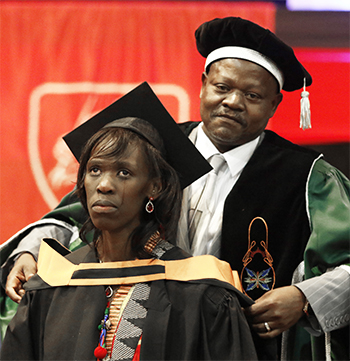Latest News Archive
Please select Category, Year, and then Month to display items
04 April 2024
|
Story Lunga Luthuli
|
Photo SUPPLIED
 Dr Juliet Kamwendo champions gender-inclusive climate action in Africa. Her expertise at the recently held AFR100 workshop highlighted vital steps towards sustainable and equitable development.
Dr Juliet Kamwendo champions gender-inclusive climate action in Africa. Her expertise at the recently held AFR100 workshop highlighted vital steps towards sustainable and equitable development.
Dr Juliet Kamwendo, Lecturer and Programme Director for Gender Studies in the Centre for Gender and Africa Studies at the University of the Free State, is spearheading efforts to integrate gender considerations into Africa's climate restoration agenda. Reflecting on her involvement, Dr Kamwendo stated, "This is particularly crucial, as women make up almost 50% of the population in Africa, and the depletion and degradation of land affect them disproportionately."
She recently served as a gender expert at the AUDA-NEPAD AFR100 workshop in Ouagadougou, Burkina Faso, from 25 to 29 March 2024. This initiative aims to restore forests and degraded land across Africa by 2030, with a focus on gender equality.
The workshop emphasised the integration of gender perspectives into the AFR100 project, acknowledging the disproportionate impact of land degradation on women. Dr Kamwendo's expertise highlighted the need to empower women in climate change interventions, addressing existing gender inequalities exacerbated by environmental degradation.
“Women – who are primarily responsible for household food security and water provision – bear the brunt of environmental degradation, leading to increased workloads, reduced income opportunities, and heightened vulnerability to climate-related disasters. Furthermore, the loss of forest cover and biodiversity further exacerbates the challenges faced by women, particularly in rural areas where they depend heavily on natural resources for their livelihoods,” added Dr Kamwendo.
Her participation highlights academia's crucial role in fostering inclusive and sustainable development, emphasising interdisciplinary collaboration to tackle complex environmental challenges. Through initiatives such as AFR100, stakeholders are working towards a more resilient and gender-responsive future for Africa.
Visually impaired UFS student an inspiration
2016-10-05

Zingisa Ngwenya at the 2016
Spring Graduation Ceremony at the Callie Human
Centre on the UFS Bloemfontein Campus.
Photo: Johan Roux
“Zingisa, I saw the tears streaming down your face when you were being hooded,” said an emotional Dr Khotso Mokhele, Chancellor of the University of the Free State. “And you were not the only one with tears streaming down your face.”
Zingisa Ngwenya, a visually impaired BA Communication Science student, was one of those who graduated at the UFS 2016 Spring Graduation on 15 September 2016 at the Bloemfontein Campus. By her side were her guardians, Derek Watts, the presenter of the current affairs TV programme Carte Blanche, and his wife Belinda.
Dream becomes reality with support from community
Watts first met Ngwenya at the Audi Pioneer School Rally in Worcester, Western Cape, in which she was his co-driver. He admired her ability to read all her instructions in braille. “I was inspired by her because she had lost her sight late in her school career,” said Watts at the graduation ceremony. Ngwenya was academically strong and her aspirations to go to university led to the relationship.
The UFS Centre for Universal Access and Disability Support, the Kirsty Watts Foundation, Gavin Fourie from Richmond, and Symington and De Kok law firm in Bloemfontein helped make Ngwenya’s dream a reality. “We managed the facility for her to do well, but it’s nothing compared to what she has done to get this degree,” Watts said.
Support from Watts family made things possible
Ngwenya will be studying towards a law degree at UFS, as well as working part-time at, Symington and De Kok. “She never bemoans what has happened to her in life. She just looks ahead to make the most of her life,” Watts said.
“Derek and Belinda’s support means everything to me. Without them it would not have been possible because it has really been a struggle, but they believed in me,” Ngwenya said.